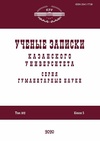Образованный человек и философия (Делает ли образование человека образованным?)
Educated person and philosophy (Does education make a person educated?).
Author(s): Fanil Fagimovich SerebryakovSubject(s): History of Philosophy, Philosophy of Science, School education, Philosophy of Education, Pedagogy
Published by: Казанский (Приволжский) федеральный университет
Keywords: education; educated person; uneducated person; human education; omnifarious knowledge; point of view; philosophy; thinking; free thought; universal;
Summary/Abstract: The article discusses the question of who counts as an educated person. The general concept of an educated person seems to be too broad, abstract, and meaningless. This concept is inadequate for sociological, anthropological, and cultural analysis, because it specifies no clear measure or criterion of an educated person. If the general definition is turned into a more concrete and historically based one, it will be more productive and efficient in terms of research. When education becomes a subject of “historical philosophizing”, it evolves from “gaining systematized knowledge and skills” to “upbringing an educatee’s personality”, which is a socio-philosophical matter. The article discusses various meanings of the latter definition. Starting from G.W.F. Hegel’s ideas about education, the exact meaning of the concept of an educated person and the features distinguishing them from an uneducated person are analyzed. The conclusion is drawn about the place of philosophy in the process of education (obviously, its role is decisive).
Journal: Ученые записки Казанского университета. Серия Гуманитарные науки
- Issue Year: 163/2021
- Issue No: 4-5
- Page Range: 238-254
- Page Count: 17
- Language: Russian

